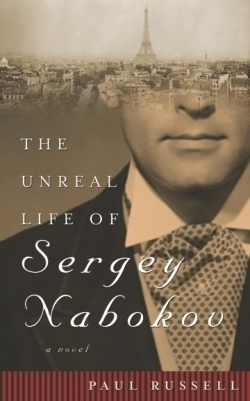The Unreal Life of Sergey Nabokov
- 2011 INDIES Winner
- Silver, Gay & Lesbian (Adult Fiction)
Like rubble filled lots in historic neighborhoods, the gaps in history and literature captivate the mind. A little information covering a great expanse of time can whet the imagination where an abundance of proof would stifle it.
Many entertaining stories—from Lin Haire-Sargent’s inventive H: The Story of Heathcliff’s Journey Back to Wuthering Heights to Alan Moore’s steampunk classic, The League of Extraordinary Gentlemen—have been erected on these underdeveloped lots. Similarly, Paul Russell’s The Unreal Life of Sergey Nabokov: A Novel builds upon those dazzling days between the overthrow of the Russian Tsar and the rise of the Third Reich. Through the perspective of the real, but little-known Sergey Nabokov, younger brother of Lolita’s creator,Vladimir Nabokov, Russell brings his readers on a wild romp through the gay and artistic cliques that were changing the face of the art and literary worlds in the 1920s and 30s..
Based on imagined interactions supplemented with exacting research, Russell, author of The Coming Storm and professor of English at Vassar College, found an antagonist who was always there. Rarely a writer, never a painter, and only an amateur musician, Vladimir Nabokov’s younger brother witnessed rather than participated in history: he smoked opium with Cocteau; paid homage to the arts at 27 rue de Fleurus, where Stein and Toklas held court; and celebrated the premier of Les Noces on a barge with Picasso, Serge Lifar, and Igor Stravinsky.
One can only hope Russell’s lectures evidence the same subtle, dark wit that makes The Unreal Life of Sergey Nabokov a pleasure to read. As WWII begins and then drags on, several characters take shelter in cities outside Berlin. One character goes so far as to say, “My wife and daughter are perfectly safe, staying with her parents in Dresden, which I am told presents no military or industrial targets whatsoever for the RAF.” With rare perfect timing, Russell allows his characters to make similar comments completely unaware of history’s hammer, poised and ready to slam down.
This nescience combined with a lack of agenda makes Sergey the perfect guide through history. He is the everyman, fascinating not through any action of his own but by the complexities of the time in which he lives. Or to turn Sergey’s observation of his famous brother back onto himself (and therefore back onto Russell), “[…]he evokes a sense of lives overheard, urgent voices in other rooms, a slammed door somewhere, confirming one’s nagging suspicion that life’s real narrative, its fatal pattern, is always going on in secret, only vaguely apprehended by its human participants.”
Reviewed by
Joseph Thompson
Disclosure: This article is not an endorsement, but a review. The publisher of this book provided free copies of the book and paid a small fee to have their book reviewed by a professional reviewer. Foreword Reviews and Clarion Reviews make no guarantee that the publisher will receive a positive review. Foreword Magazine, Inc. is disclosing this in accordance with the Federal Trade Commission’s 16 CFR, Part 255.

